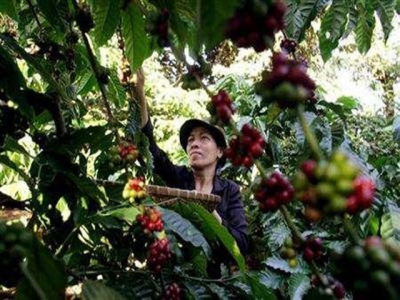Vietnam March coffee exports seen falling; muted activity in Indonesia

Vietnam’s coffee exports in March are estimated to fall 28.8-33.5 percent from a year earlier to 140,000-150,000, traders said on Thursday, as activity in Indonesia remained muted this week.
A woman collects coffee beans at her coffee garden outside Vietnam's Central Highlands, October 24, 2006. Photo: Reuters
“Sales are slowing due to low prices, while many buyers are turning to buy from Brazil, where prices are even lower partly due to the recent weakening of the real,” a Ho Chi Minh City-based trader said.
Customs data released earlier this month showed Vietnam’s coffee shipments in the first half of March totalled 83,120 tonnes, compared with 99,585 tonnes in the same period last year. The government’s General Statistics Office is scheduled to release March coffee export data on Friday.
Farmers in the Central Highlands sold coffee at 32,000-33,100 dong ($1.38-$1.43) per kg on Thursday, narrowing from a range of 31,900-33,300 dong last week.
Globally, coffee growers are being forced into poverty by low international prices for the crop, farmers’ representatives said at an international conference in Bogota on Wednesday, warning the future of the industry is at risk.
Traders in Vietnam offered 5 percent black and broken grade 2 robusta at a $30-$50 per tonne discount to the July contract. They offered a $55-$60 discount to May contract last week.
Meanwhile, in Indonesia, activity remained muted this week on lacklustre demand from buyers, despite supplies from a mini harvest there.
Premium for the grade 4 defect 80 robusta was steady on last week at $70-$80 to the May contract on Thursday, a trader in Sumatra’s Lampung province said.
May robusta coffee settled down $6, or 0.4 percent, at $1,504 per tonne on Wednesday.
Related news
 Southern provinces replace crops on ineffective rice growing area
Southern provinces replace crops on ineffective rice growing area Particularly, Southern provinces had switched to cultivate fast-growing crops, such as corns, peanuts, soy beans and vegetables, and fruit trees
 Japanese take to Vietnamese coffee
Japanese take to Vietnamese coffee Japan has increased its imports of Vietnamese coffee thanks to low prices and the geographic proximity between the two countries.
 Saigon grocery store shuns plastics to wrap products in banana leaves
Saigon grocery store shuns plastics to wrap products in banana leaves A grocer’s in Ho Chi Minh City has garnered extremely positive feedback from customers by ditching the common plastic wrap to switch to the more traditional ban